Detroit’s Gone to Their Heads: Boosters Push Love for City, Parade
The papier-mâché noggin capital of the world is right here in Detroit, housed in an old East Side industrial complex. A volunteer group wants you to put one on and march with them in the Thanksgiving Parade.
Last year, Sean Moran and three buddies were chatting after a basketball game about how cool it would be to march in the Thanksgiving Day parade – a Detroit tradition they had cherished since childhood.
Months later, after a rousing “let’s do it,” they were balancing giant papier-mâché heads on their shoulders, parading south down a two-mile stretch of W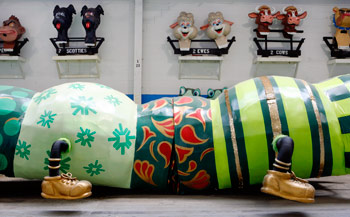 oodward Avenue in sleet and pouring rain.
oodward Avenue in sleet and pouring rain.
Moran chuckles when speaking of the 30-pound Gerald Ford caricature he wore on his back last November that teetered and wobbled in the wind. But he says that being part of the parade was rewarding and fun – and not as uncomfortable as he had imagined. “I had a riot. Seeing joy on the children’s faces as you shook hands and said ‘Happy Thanksgiving’ was great.”
After the parade, Moran and companions Jim Dailey, Steve Booher and Brian Urso, long-time friends from grade school, high school and college, were charged up by their stroll down M-1. “We got so much out of it,” says Moran. “We couldn’t believe it was free.”
Revved up with enthusiasm from their initial head-wearing encounter, they decided to form the Big Head Corps to recruit more people to wear heads in the parade and to raise funds to preserve the current heads warehoused at the Parade Company’s Studio A on Mt. Elliott, in an old industrial complex on Detroit’s East Side. “We fig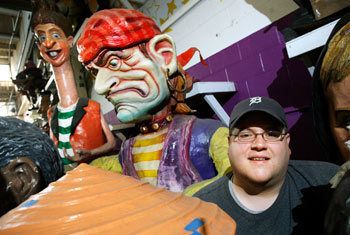 ured it was an opportunity to take dinged up or trashed heads and help bring them back to life,” says Moran.
ured it was an opportunity to take dinged up or trashed heads and help bring them back to life,” says Moran.
Tradition started in Italy
“These guys were upset that only 32 heads walked in the parade last year,” says Steve Abood, marketing director for the Parade Company, of the four friends. “They wanted to get more heads involved, especially since we own more than 300 of them.”
In fact, the Parade Company owns the largest collection of papier-mâché heads in the world, and the heads have a long, beautiful history. The original heads were purchased by Hudson’s from artists in Viareggio, Italy, in the 1940s, with the oldest head in Detroit dating back more than 80 years.
The annual Viareggio Carnival, started in the 1870s, still showcases papier-mâché effigies and floats. Abood says that the heads used to be burned at the end of the festivities. Surprised to find Americans that valued them as artifacts, some of Viareggio’s artists traveled to Detroit in 1989 to teach local artists how to make them. Abood says that four to five Parade Company artists have been trained in head-making (a long, involved process that starts with sculpting a head fro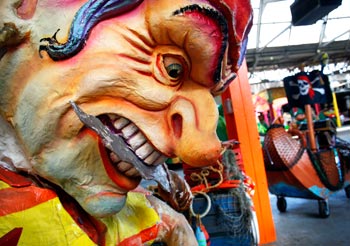 m a 500-pound lump of clay). Many new heads have been made over the past 50 years, with the last 15 (called the “Heads of Detroit”) commissioned in 2001 for the city’s 300th birthday.
m a 500-pound lump of clay). Many new heads have been made over the past 50 years, with the last 15 (called the “Heads of Detroit”) commissioned in 2001 for the city’s 300th birthday.
While some of the older heads are historic relics and cannot be worn again, a good portion of them simply need repairing or to have costumes sewn to accompany them. According to Abood, 115 heads are ready to wear this November – including a yellow-faced, green-lipped clown with a long orange nose; a long-haired, open-mouthed Bob Seger; a blonde-haired, pie-eyed Polish girl; and a happy, rosy-cheeked pig.
The Big Head Corp has already recruited 39 members to join other Parade Company volunteers in donning the heads on Thanksgiving Day. Corps members get to choose from an array of animals, sinister and smiley clowns, ethnic girls and the “Heads of Detroit,” which include Rosa Parks, Father Cunningham, Joe Louis and Diana Ross.
Interactive activists
To join the Big Head Corps, members pay $200 for the privilege to march in the parade and to support the preservation of current heads 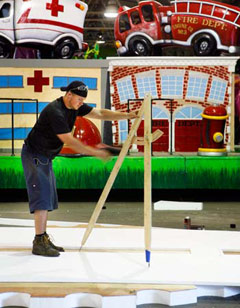 and commissioning of new heads. Members enjoy a number of perks, like two VIP parade-day grandstand tickets to share with friends or family, a t-shirt and photograph, and four Parade Preview Party tickets.
and commissioning of new heads. Members enjoy a number of perks, like two VIP parade-day grandstand tickets to share with friends or family, a t-shirt and photograph, and four Parade Preview Party tickets.
But Moran says that the corps is mostly a fun way to give back to the community that will bring folks together for a common cause. “It’s easy to sit home on parade day and watch it from your chair,” he says. “The Big Head Corps makes it easy and fun to be a part of it.” Corps membership to date is split about 50/50 men and women, ages 25 to 45.
“We want an interactive group that will support the parade and the city and create opportunities for people to network,” says Moran, a senior vice president of wealth management at Smith-Barney by day and head honcho of the Big Head Corps by night. “We want it to lead to other things, like friendships and business contacts – it’s an interactive activists group.”
Why has Moran taken up the cause with such vigor?
“So many of Detroit’s treasures have gone by the wayside that we always thought were a given,” says Moran. “The Belle Isle fountain lighting up at night, skating at Hart Plaza, the zoo and train on Belle Isle. All these things we just let go. We (Big Head Corps founders) said ‘enough of that.’”
Moran says that he wants to institute a sense of pride about the uniqueness of the papier-mâché head collection. “W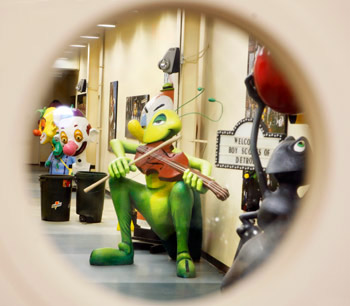 hen you have the best of something,” he says “why not keep it good and then make it bigger and better?”
hen you have the best of something,” he says “why not keep it good and then make it bigger and better?”
To learn more about the Big Head Corps, join the founders and their big-headed friends at these upcoming recruitment events:
Sept. 17, 7-10 p.m., at Mosaic, 501 Monroe St., Detroit;
Oct. 16, 7-10 p.m., Atwater Block Brewery, 237 Jos. Campau, Detroit.
Freelance writer Melinda Clynes is a regular contributor to Model D.






